BusinessEurope Headlines No. 2022-35
Business leaders exchange views with the European Commission
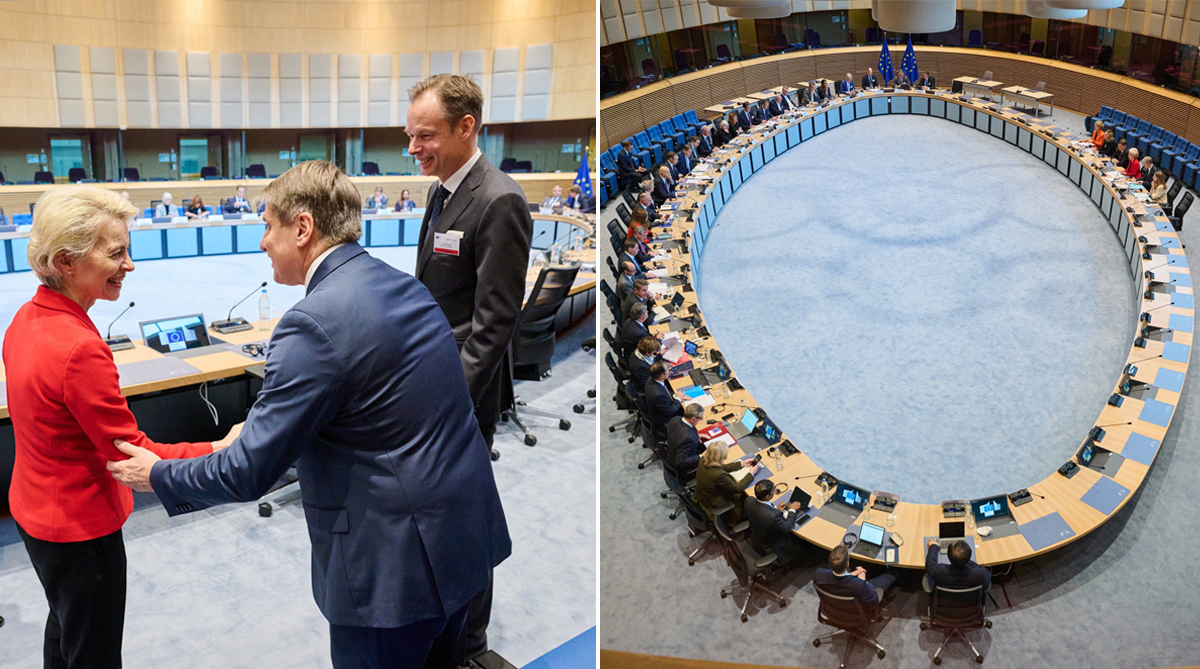
BusinessEurope President Fredrik Persson, Director General Markus J. Beyrer and 30 business leaders from our Advisory and Support Group met with the political leadership of the European Commission in Brussels. They exchanged views with President von der Leyen, Executive Vice-Presidents Valdis Dombrovskis and Margrethe Vestager, as well as European Commissioners Gentiloni (Economy) and Valean (Transport). Together they tackled a range of issues of pressing relevance for business such as the energy crisis, competitiveness, the economic and geopolitical situation and the twin climate and digital transition.
Contact: Alexandre Affre
Photo © European Union
Video message
COP27: taking stock of negotiations
While some progress has been achieved at the COP27, it is far from being sufficient. Watch our President Fredrik Persson talk about what European businesses expect from the negotiations.
Encouraging EU-Japan cooperation in the face of common challenges
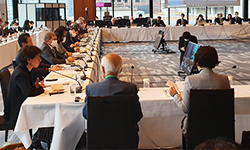 Luisa Santos, Deputy Director General of BusinessEurope, participated at the 24th annual meeting of the EU-Japan Business Roundtable (BRT) on 15 November. The BRT is the key bilateral business forum bringing together senior executives from leading European and Japanese companies and organisations that represent a significant part of the EU and Japanese industry and cover a broad range of sectors. The BRT reviews issues affecting trade, investment and other forms of cooperation, and issues recommendations to the EU and Japan Authorities. This year’s meeting had a special focus on the green and digital agendas as well as emerging geopolitical risks. “In the face of mounting geopolitical tensions, the EU and Japan are more aligned than ever, and both sides should use the momentum to increase cooperation in the green and digital areas, while upholding rules-based trade”, Santos said. She added that the Economic Partnership Agreement (EPA) is a good platform to work bilaterally and set common standards. This would encourage joint innovation in digital and green technologies, while promoting those standards globally.
Luisa Santos, Deputy Director General of BusinessEurope, participated at the 24th annual meeting of the EU-Japan Business Roundtable (BRT) on 15 November. The BRT is the key bilateral business forum bringing together senior executives from leading European and Japanese companies and organisations that represent a significant part of the EU and Japanese industry and cover a broad range of sectors. The BRT reviews issues affecting trade, investment and other forms of cooperation, and issues recommendations to the EU and Japan Authorities. This year’s meeting had a special focus on the green and digital agendas as well as emerging geopolitical risks. “In the face of mounting geopolitical tensions, the EU and Japan are more aligned than ever, and both sides should use the momentum to increase cooperation in the green and digital areas, while upholding rules-based trade”, Santos said. She added that the Economic Partnership Agreement (EPA) is a good platform to work bilaterally and set common standards. This would encourage joint innovation in digital and green technologies, while promoting those standards globally.
Contact: Elena Suárez
Digital up and re-skilling vital for growth and competitiveness
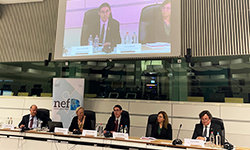 Up and re-skilling is essential in the context of the digital and green transitions and against the backdrop of an ageing workforce and acute labour and skills shortages. With only just over half of European workers having at least basic digital skills, this needs to be a key focus area of up and re-skilling initiatives at European and national levels. Digital skills are important across jobs and sectors. Where labour and skills shortages are strongest is at the intersection with the wider set of STEM (Science, technology, engineering, and mathematics) skills, which employers identify a particular demand for and that need to be promoted across all levels of education and training. These were among the key messages given by Robert Plummer, BusinessEurope Senior Adviser, during the New Education Forum, which took place in Brussels on 15 November. As part of the process of fostering digital skills attainment, it is also crucial to support the training needs of teachers and trainers so that they are better equipped to effectively teach people digital skills, including in an online and remote format. To this effect, there should be more industry exposure for teachers and trainers, i.e. giving them opportunities to go into workplaces, to talk to employers and to see how companies operate first-hand and the skills that employers need.
Up and re-skilling is essential in the context of the digital and green transitions and against the backdrop of an ageing workforce and acute labour and skills shortages. With only just over half of European workers having at least basic digital skills, this needs to be a key focus area of up and re-skilling initiatives at European and national levels. Digital skills are important across jobs and sectors. Where labour and skills shortages are strongest is at the intersection with the wider set of STEM (Science, technology, engineering, and mathematics) skills, which employers identify a particular demand for and that need to be promoted across all levels of education and training. These were among the key messages given by Robert Plummer, BusinessEurope Senior Adviser, during the New Education Forum, which took place in Brussels on 15 November. As part of the process of fostering digital skills attainment, it is also crucial to support the training needs of teachers and trainers so that they are better equipped to effectively teach people digital skills, including in an online and remote format. To this effect, there should be more industry exposure for teachers and trainers, i.e. giving them opportunities to go into workplaces, to talk to employers and to see how companies operate first-hand and the skills that employers need.
Contact: Robert Plummer
The EU has a central role in revitalising the global trading system
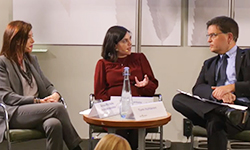 “The global trading system is currently at a juncture point. Amongst all the different crises and challenges that we face – from the war in Ukraine and the continuous impact of the COVID-19 pandemic, to climate change and the pursuit of digital transformation – do we continue a business-as-usual model, or do we adapt? – We clearly need to adapt”, argued Sofia Bournou, Senior Adviser at BusinessEurope’s International Relations department, at a panel discussion on the EU’s role in revitalising the global trading system. The discussion took place in the framework of the Net@Work 2022 conference organised by the Wilfred Martens Center for European Studies, in collaboration with the Hans Seidel Foundation on 15 November. In the current environment, supporting a rules-based trade remains a key priority for European business. At multilateral level, reforming the World Trade Organisation (WTO) is a priority. At bilateral level, pursuing an ambitious EU trade policy agenda that includes the conclusion of trade agreements is critical. The EU is not alone in facing global challenges. Developing a close dialogue and cooperation with key trading partners, such as with the U.S. under the Trade and Technology Council (TTC), is very important in this respect.
“The global trading system is currently at a juncture point. Amongst all the different crises and challenges that we face – from the war in Ukraine and the continuous impact of the COVID-19 pandemic, to climate change and the pursuit of digital transformation – do we continue a business-as-usual model, or do we adapt? – We clearly need to adapt”, argued Sofia Bournou, Senior Adviser at BusinessEurope’s International Relations department, at a panel discussion on the EU’s role in revitalising the global trading system. The discussion took place in the framework of the Net@Work 2022 conference organised by the Wilfred Martens Center for European Studies, in collaboration with the Hans Seidel Foundation on 15 November. In the current environment, supporting a rules-based trade remains a key priority for European business. At multilateral level, reforming the World Trade Organisation (WTO) is a priority. At bilateral level, pursuing an ambitious EU trade policy agenda that includes the conclusion of trade agreements is critical. The EU is not alone in facing global challenges. Developing a close dialogue and cooperation with key trading partners, such as with the U.S. under the Trade and Technology Council (TTC), is very important in this respect.
Contact: Bournou Sofia
Discussing the proposal for an EU forced labour ban regulation
 “BusinessEurope generally welcome the European Commission proposal for a regulation on prohibiting products made with forced labour on the Union market. Forced labour is a serious human rights violation fully condemned by the European business community that, over the past years, has increased its knowledge and efforts to address issues in their supply chains, at company level, but also with sectoral initiatives”, stated Sofia Bournou, Senior Adviser at BusinessEurope’s International Relations department at the hearing on the forced labour ban organised on 15 November by the European Economic and Social Committee (EESC). In the discussion, Bournou brought up the need for a risk-based and workable approach in the context of the Single Market, based on international standards such as the International Labour Organisation conventions She also drew the attention to the fact that, as forced labour is a global concern, more efforts are required by the EU to raise awareness at international level, working closely with trading partners and making use of all instruments available – trade agreements, the EU Generalised System of Preferences (GSP), human rights dialogues – to address this issue effectively. The role of stakeholders, including business, in this process is critical.
“BusinessEurope generally welcome the European Commission proposal for a regulation on prohibiting products made with forced labour on the Union market. Forced labour is a serious human rights violation fully condemned by the European business community that, over the past years, has increased its knowledge and efforts to address issues in their supply chains, at company level, but also with sectoral initiatives”, stated Sofia Bournou, Senior Adviser at BusinessEurope’s International Relations department at the hearing on the forced labour ban organised on 15 November by the European Economic and Social Committee (EESC). In the discussion, Bournou brought up the need for a risk-based and workable approach in the context of the Single Market, based on international standards such as the International Labour Organisation conventions She also drew the attention to the fact that, as forced labour is a global concern, more efforts are required by the EU to raise awareness at international level, working closely with trading partners and making use of all instruments available – trade agreements, the EU Generalised System of Preferences (GSP), human rights dialogues – to address this issue effectively. The role of stakeholders, including business, in this process is critical.
Contact: Bournou Sofia
Tackling musculoskeletal disorders in partnership
 The persistence of musculoskeletal disorders (MSDs) at the workplace is not due to a lack of EU legislation but rather due to the difficulties of getting to grip with this multifaceted problem from a practical prevention and risk management point of view. Furthermore, MSDs are exacerbated by non-work-related issues, including an increase in sedentary lifestyles, which is the reason why MSDs will most likely remain a persistent issue despite the many efforts made by employers and the greater awareness fostered by the Healthy Workplaces Campaign 2020-22. Nevertheless, the European business community is proud to look back at the many achievements made under the campaign and is committed to remaining a proactive partner in effectively tackling MSDs. In order to achieve this, we underline the need to address the issue from a holistic perspective and to further promote the close collaboration and open dialogue between the social partners at the company and/or sectoral level. These were the main messages given by Isaline Ossieur, BusinessEurope Social Affairs Junior Adviser, during the opening session of the Healthy Workplaces Summit “Lighten the Load”, organised by EU-OSHA in Bilbao on 14 and 15 November.
The persistence of musculoskeletal disorders (MSDs) at the workplace is not due to a lack of EU legislation but rather due to the difficulties of getting to grip with this multifaceted problem from a practical prevention and risk management point of view. Furthermore, MSDs are exacerbated by non-work-related issues, including an increase in sedentary lifestyles, which is the reason why MSDs will most likely remain a persistent issue despite the many efforts made by employers and the greater awareness fostered by the Healthy Workplaces Campaign 2020-22. Nevertheless, the European business community is proud to look back at the many achievements made under the campaign and is committed to remaining a proactive partner in effectively tackling MSDs. In order to achieve this, we underline the need to address the issue from a holistic perspective and to further promote the close collaboration and open dialogue between the social partners at the company and/or sectoral level. These were the main messages given by Isaline Ossieur, BusinessEurope Social Affairs Junior Adviser, during the opening session of the Healthy Workplaces Summit “Lighten the Load”, organised by EU-OSHA in Bilbao on 14 and 15 November.
Contact : Isaline Ossieur
EU business calls for a more ambitious trade policy for Africa
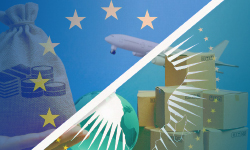 On 16 November 2022, BusinessEurope published its new position paper “A more effective EU trade policy for Africa”. At a time when European companies seek to diversify their supply chains, sources of raw materials, production locations and markets, the geographic proximity of the African continent to Europe can create opportunities for many African countries. At the same time, the African Continental Free Trade Area promises to improve the conditions for regional value chains to emerge on the continent by helping overcome long-standing barriers to regional trade and investment. To tap into this potential, the BusinessEurope position paper calls on the EU to pursue a more ambitious trade policy vis-à-vis the continent. This should involve increasing the number of African countries covered by preferential trade agreements with the EU, modernising and deepening existing trade agreements with African countries and regions and exploring the scope for innovative agreements in areas such as investment facilitation or digital trade. In addition, EU development policy must better flank trade measures to improve the investment climate in partner countries, mitigate risks, help African companies to meet European standards and support African governments in complying with their commitments, particularly on sustainability.
On 16 November 2022, BusinessEurope published its new position paper “A more effective EU trade policy for Africa”. At a time when European companies seek to diversify their supply chains, sources of raw materials, production locations and markets, the geographic proximity of the African continent to Europe can create opportunities for many African countries. At the same time, the African Continental Free Trade Area promises to improve the conditions for regional value chains to emerge on the continent by helping overcome long-standing barriers to regional trade and investment. To tap into this potential, the BusinessEurope position paper calls on the EU to pursue a more ambitious trade policy vis-à-vis the continent. This should involve increasing the number of African countries covered by preferential trade agreements with the EU, modernising and deepening existing trade agreements with African countries and regions and exploring the scope for innovative agreements in areas such as investment facilitation or digital trade. In addition, EU development policy must better flank trade measures to improve the investment climate in partner countries, mitigate risks, help African companies to meet European standards and support African governments in complying with their commitments, particularly on sustainability.
![]() Contact: Benedikt Wiedenhofer
Contact: Benedikt Wiedenhofer
Calendar 
- 24 November: 14th Citizens’ Energy Forum
- 25 November: BUSINESSEUROPE Council of Presidents
- 28-30 November: SME Assembly 2022
- 6 December: EU-Western Balkans summit
Not yet a subscriber? Register here.
Reminder: please have a look at our privacy policy